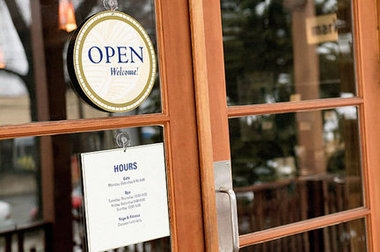The more relevant written content presented on your website, the more likely your site will appear in search results.

Being wordy isn’t the only way to make your small business website out perform your competitors in search engines, but having more to say about your business is far better for your website presence than not saying enough.
Beyond a brief explanation of the business, many small business owners don’t know what to say when asked to elaborate about their company. If writing seems overwhelming, record a conversation about your business. If questions come up, answer them and turn those questions and answers into an FAQ section of your website. I would encourage my clients to talk about their business. Talk about the products, the services, the reasons you do the things you do and sell the things you sell the way you do. Talk about why a customer should use you. Talk about what your customers have to say about you and if your company has any awards or belongs to any groups and why. We don’t have to worry about running out of space on the page of a brochure, there’s plenty of room for text on any and every webpage on your site. Over explain.
Loads of content don’t ensure high website conversion rates or low bounce rates. Conversions are turning a visitor into a lead by encouraging them to take action while on your site either by filling out a form to contact you or picking up the phone to call. Bounce rates are how quickly a website visitor who finds your site visits and then leaves. If they leave quickly, the bounce rate is high. Expansive web copy, however, does increase the likelyhood that your website will be found and visitors will show up in the first place. Once there, then conversions and bounce rate come into play.
On Your Mark Provides Internet Marketing Strategies to Help NJ Small Business Owners Grow. Call us 732-496-4677 or Contact Us today.
A good webmaster will take all that text and break it up for readability. Rough copy can be edited so instead of being tempted to copy text from competitor’s websites, write about your business in your own words. Headlines, subheadlines, bulleted lists and imagery can make a page much more attractive and invite the reader to continue reading. Adequate font size and leading (the vertical space between each line of text), clear and consistent navigation and calls to action also helps to lead visitors through the site and just in case they don’t, the most important information should be closer to the top of each page, “above the fold”, which is the first view of the page before a visitor has to scroll down.
Having plenty of text about your business doesn’t just better inform your website visitors about your company, it better informs search engines about what to do with your website and how to index your site in search results. For example, a webpage that only includes gallery photos of your paintings will not appear in search results as often or as high as a site that explains about the inspiration for the collection of work, the medium used to create them, the setting or subject of the paintings, the dates, times and location of the next art show where the works can be seen in person and purchasing information along with the photo gallery of the paintings. A short caption beneath each image is important but is not enough to give your content the weight it needs to make an impression in search results.

Remember that web design is fluid and can always change. Writing content for your website should not end when the site is launched and online working for you. Each time you add a new product or service, host or participate in an event, offer a discount on something you do or want to congratulate an exceptional employee for outstanding service, send new content to your webmaster and freshen up your site. You won’t run out of room and the copy will add weight to your domain.
